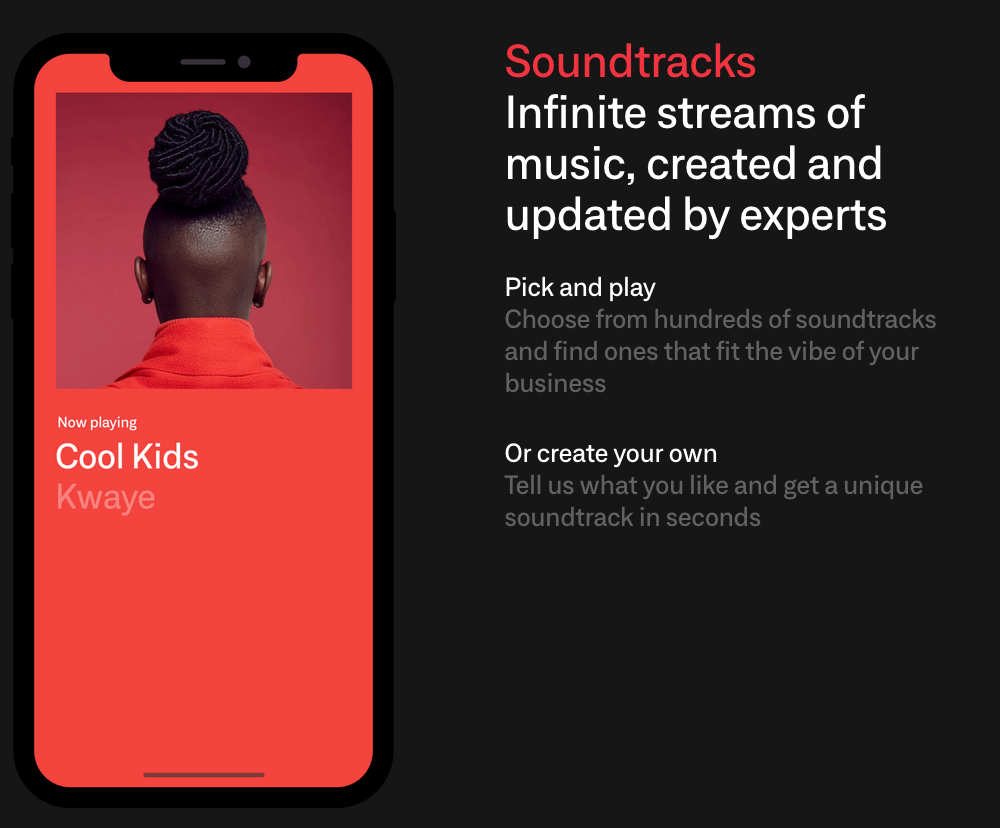Background
It takes incredibly dedicated and talented specialists to launch a game-changing tech offer. So it’s little wonder that the teams involved sometimes get caught up in technical detail and lose sight of what their audiences need to know – and even understand.
This was the case for Soundtrack when they contacted us in 2018.
The music-streaming-for-business app was founded in 2013, with the backing of Spotify. Their offer is innovative in a number of ways. Via a simple interface, for example, a business can select brand values and characteristics, and Soundtrack will then create brand-aligned playlists – providing music that sounds and feels right for a brand. Soundtrack has commissioned research that shows brand-aligned music positively influences customer perceptions of retail and restaurant environments – and actually makes them spend more.
In addition to this, business owners can delete tracks they don’t like, or choose not to have certain types of music or lyrics – and Soundtrack’s advanced machine learning will then only serve music that’s right.
Other business-friendly features include being able to schedule different soundtracks for different times of day – or different zones of a retail space, for example. Soundtrack also lets business owners control music across several venues, all from one central hub – which stops local teams hijacking the company sound system to play their own tunes.
And that’s just the technology. Another step Soundtrack has taken has been to create a completely different model for paying musicians. By law, anyone who plays music in a commercial setting has to pay royalties to artists – and they generally do this by paying a monthly fee to licensing agencies. Soundtrack thought there were too many problems with this model.
For one, there isn’t a direct correlation between airtime and payment for artists – because the licensing authorities calculate royalties payable by the proportion of time artists get radio airtime.
So Taylor Swift wins in the traditional model, but a virtually unknown band whose music is popular in a hipster café will get nothing.
The other problem is that a lot of businesses don’t even know that they should be paying royalties.
So Soundtrack decided to negotiate licensing rights with all major labels. The result is that whenever an artist’s music is streamed on Soundtrack, she or he is paid directly and proportionately– and all businesses pay licensing fees automatically as part of their subscription.
Soundtrack has a lot to talk about. But they struggled to know what to talk about, when and to whom. Communicating simply was also a challenge.
When you’re so close to a product, it can be difficult to see it from an outsider’s point of view. Wordtree helped us to remember our customers – and helped us explain in clear, interesting terms.
What we did
Soundtrack initially asked us to help them with their tone of voice. We took a couple of steps back from this and suggested bringing a little extra structure to their brand. A tone of voice is an important brand asset, but we felt that we could help Soundtrack get results faster if we first focused on their messaging.
We created a brand platform, with the central premise of “Turn up the love” (as in, make your customers love you even more). We then agreed key messages for different audiences.
After this, we created a clear tone of voice. We’re now in the process of rewriting several pieces of content based on this, including: Web content, sales presenters, blog posts, campaign materials and presentations.
Results
It’s early days yet, but already there is a clear and consistent story being used and told internally – and search results for web content have shown a marked improvement.

